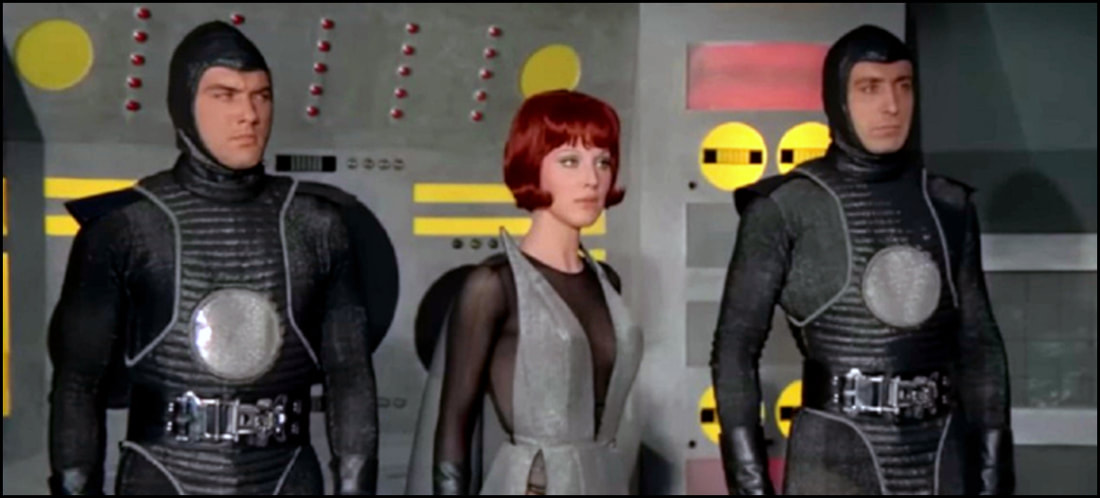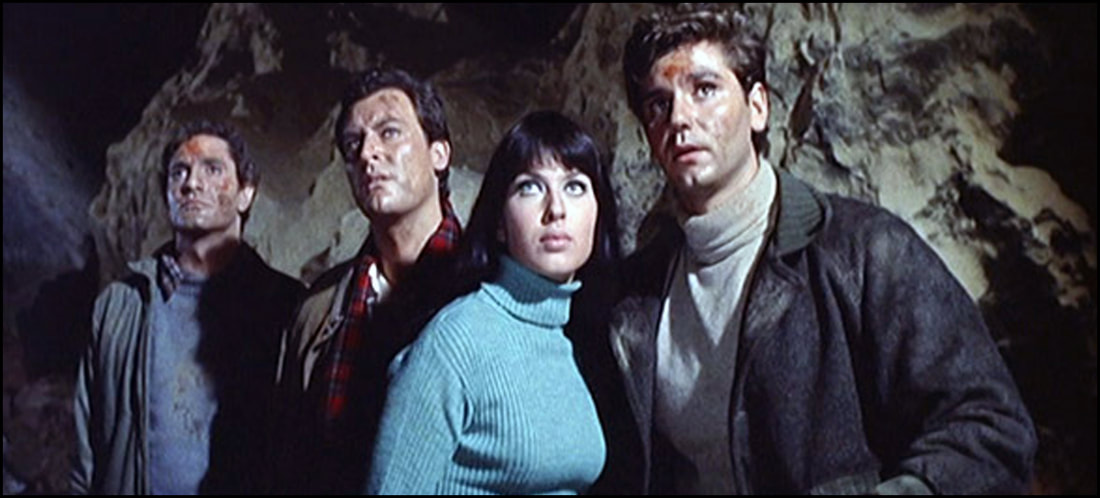(Edited) From the 2023 Blu-ray release’s product packaging:
“A kitschy sci-fi extravaganza recently restored in 4K, Star Pilot is a wildly colorful adventure through the vastness of space. Aliens from the constellation Hydra crash-land on the island of Sardinia. A prominent scientist, his daughter, several young technicians, and a pair of spies are taken hostage by the beings so they can use them to repair their spaceship’s broken engine. With that done, they take off towards their home planet, taking the Earthlings with them. However, the humans attempt to mutiny against their captors, inadvertently sending their tiny spaceship hurtling into the infinite beyond.”
From what I’ve come to understand regarding the general state of Italian cinema, its directors and screenwriters found themselves heavily influenced by theatrical trends emerging from outside their native land. For example, if Horror films were in great demand, then they’d write and direct Horror films. If Science Fiction flicks were popular at the box office, then they’d tackle the Final Frontier. The same could be said for Westerns (though it would seem that that trend endured longer than most), spy thrillers, and the like. If audiences were willing to pay to see it up in the lights, then Italian storytellers and studios were all-too-happy to oblige. This – my friends – is the true definition of capitalism: when you have a customer base, then you seek to keep it happy.
In that respect, the script for Star Pilot – IMDB.com credits it to Ian Danby, director Pietro Francisci, and Fernando Paolo Girolami – definitely feels like an amalgam of what very well may’ve been popular theatrically at the time of the feature’s production. While its story clearly leans heavily into Science Fiction – what with the subject matter of UFOs, spaceships, aliens, space princesses, and flame-barking ray guns – one might also deduce an element of light bawdy comedy (the inevitable battle of the sexes back in a day when mankind only had two of them, snicker snicker), the hints of blooming romances, and even the emerging spy movie formulas. While I’ll admit that none of these pieces come together successfully in the finished product – Pilot’s events kinda/sorta chug along haphazardly like a train in search of a depot – I’d be a fool if I failed to point out that they’re all in here … so maybe Danby, Francisci, and Girolami’s storytelling ambitions got the better of themselves at a time when their budget couldn’t deliver the scale needed for all of this to excel.
Also – from what I’ve read in IMDB.com’s trivia section on the release – a good portion of the special effects work had been culled from Toho Studio’s previous Gorath (1962) Invasion Of Astro-Monster (1965). Assuming that this was largely limited to sequences in outer space and quite possibly some of the scenes of Earth’s eventual demise, I’m left wondering how much of Pilot’s plot in the second half may have been re-engineered to work with the supplied footage instead of spinning some fantastic galactic yarn all of its own. None of that excuses Golden Motion Pictures’ somewhat obvious attempt to capitalize on box office trends; but it does beg the question as to how much producers may’ve had to ‘fit a round peg in a square hole’ instead of building one seamless story all of their own from scratch. Consequently, I think it’s safe to chalk up a portion of this one’s clunkiness to that but certainly not all of it.
Still, because Pilot at times feels like a light sex comedy and – at other times – like a spy flick – and – at even other times – like an apocalypse-themed space saga wherein no residents escape unscathed by mankind’s (and alien-kind’s) hubris, the resulting highs and lows never synchronize into one consistent attempt. Without a center to hold sway of this journey, we’re merely along for the ride, and we’re not pointed toward caring one way or the other about any of the developments. Sadly, there’s no central player or performance here either that an audience can identify with or express some affinity toward, and this leaves viewers not so much in the harsh coldness of space as it does in the harsh cold role of independent observers of plights-in-progress wherein happy endings are more contrived than they are authentically experienced much less earned.
So, thematically, Pilot is a mess of modest proportions. Roland Lesaffre’s ‘Professor Solmi’ never quite emerges as our world’s chief intellect as the script implies. His daughter Luisa (the comely Leontine Snell) plays a part that seems conceived and written as part of a space-based sex comedy – she’s misunderstood by both Earth and alien men alike, and I suspect all of it was intended as such. Indeed, her biggest contribution here would seem to be mastering costume changes; thank goodness it all looks great in body stockings and feather boas! And the fact that there’s no significant heroic male presence – even the Chinese spies are curiously bland as their stated mission seems to be just watching endlessly for whatever technology they can steal – the cast seems in search of a central collective motivation far too much of the time.
There’s no disputing that – despite some ill-timed comic bits – Pilot suggests a sinister present as well as a murky tomorrow.
What little we learn of these visitors from the Hydra constellation is alarming. Apparently, they rely on genetic engineering to produce a race of slaves to serve whatever needs society demands, and they’re not above kidnapping Earthlings to do their bidding (instead of doing it themselves?) even in the face of extinction. The fact that both Earth and their world suffer similar fates speaks to a long-established trend in Science Fiction that would grace the screen almost constantly, reminding us at almost every occasion that we’re collectively doomed if we don’t get our act together. In 1968’s seminal Planet Of The Apes, Charlton Heston had to go centuries into the future to see what shape mankind left his Earth in, and Pilot finds the time to caution us not once but twice in that film’s present day. So, yes, perhaps it bodes well that both man and the Hydrans are basically forced to collaborate in rebuilding one functioning world – setting aside their differences and repopulating the respective species – but that’s an ending we don’t get to see as no follow-up was ever made to this otherwise uneven picture.
Star Pilot (aka 2+5 Missione Hydra) (1966) was produced by Golden Motion Pictures and Sarda Cine Service. DVD distribution (for this particular release) is being coordinated via the fine folks at Kino Lorber. As for the technical specifications? Though I’m no trained video expert, I found the sights-and-sounds to this all-new 4K restoration to be surprisingly good; as I’ve both seen this thing broadcast on television as well as an earlier DVD release, I was very impressed by the look and audio here. It’s a vast improvement over what’s been available previously. Lastly, if you’re looking for special features? The disc boasts two different versions of the flick – a 91-minute Italian language original (with subtitles) along with an 86 English-dubbed version. There’s also an audio commentary hosted by author and film historian David Del Valle. Given the age of the picture – and the fact that it’s a reasonable obscure title – it’s a solid collection for folks who enjoy this sort of thing.
Recommended, but …
As I stated in my first review piece of 1966’s Star Pilot (from a 2016 standard DVD reissue), I don’t consider it a bad film, certainly not on the level that I’ve seen so many critiques on the World Wide Web. My issues with it relate entirely to the fact that its characters as so one-dimensional that no standouts truly emerge; and its story largely clunks along from development to development. There’s a deep, dark warning for mankind trapped somewhere in there – what with its thematically dire second half that would almost serve as a precursor to the Apocalyptic and/or dystopian themes that dominated so much of Science Fiction throughout the late 1960’s and well into the 1970’s.
In the interests of fairness, I’m pleased to disclose that the fine folks at Kino Lorber provided me with a complimentary Blu-ray of Star Pilot (1966) by request for the expressed purposes of completing this review. Their contribution to me in no way, shape, or form influenced my opinion of it.
-- EZ



 RSS Feed
RSS Feed